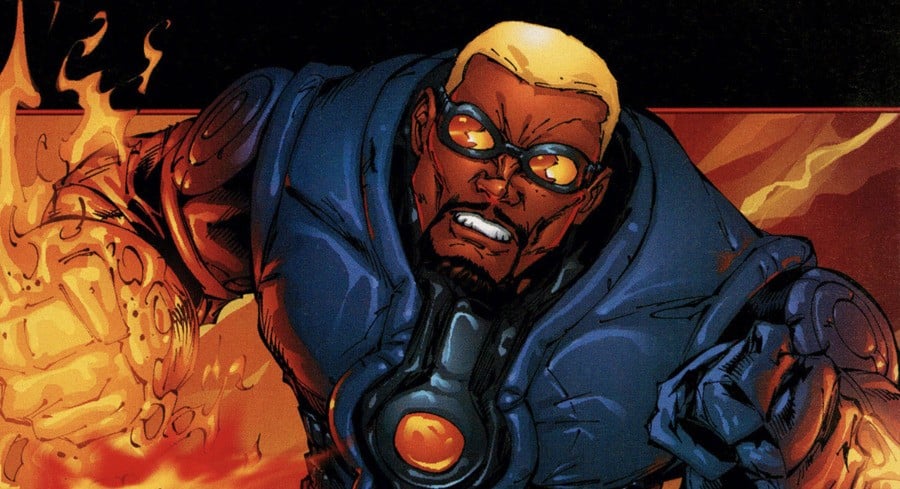
Sanity: Aiken's Artifact isn't a title that typically comes up in conversation all that much today. But, regardless, I'd argue it's one of Monolith Production's more fascinating projects.
Released in the year 2000 for Windows PCs, the 3D top-down action RPG was part of a two-game deal with Fox Interactive, which also included The Operative: No One Lives Forever (the Washington studio's 1960s-themed first-person shooter), and was notable for a few different reasons. Not only did it feature a fairly innovative Magic the Gathering-inspired mechanic that saw players collecting special spell-like cards, called "Talents", to unlock new elemental abilities, but it also included the video game debut of the rapper/musician/actor Ice T, who starred as Nathaniel Cain, a rough around the edges paranormal agent tasked with stopping a world-ending conspiracy.
At the time, Ice-T was already a well known figure in the world of music and entertainment. Originally, he had made a name for himself as a rapper in the early 80s, before becoming known as the frontman of the controversial heavy metal group Body Count in 1990, and as an actor in a number of film and television projects, such as New Jack City (1991), Johnny Mnemonic (1995), and New York Undercover (1995). His involvement, therefore, was seen as a great marketing tool for the computer game, being an easy way of getting more attention and attracting more eyeballs to the title.

What you might not know, though, is that he wasn't necessarily the first choice to play the role of Cain, with another actor having already recorded the entirety of the Cain's dialogue, before they were switched out entirely late in its production. Recently, we had the opportunity to chat to various members of Sanity's development team, as well as its producer at Fox Interactive Gary Sheinwald, who gave us more insight into how Ice-T became the lead actor on the project, and what it was ultimately like working with the celebrity in his studio.
According to Monolith Productions co-founder, Garrett Price, the origins of Sanity: Aiken's Artifact all began with an individual named Aaron St. John, a game designer at Monolith Productions and the brother of Alex St. John (one of the creators of the original Microsoft DirectX technology platform at Microsoft).
As Price recalls, the studio at the time were soliciting ideas from a bunch of different people internally, which led Aaron to create a pitch for a game inspired by collectible card games of the time.
"Sanity was basically a card duelling game," says Price. "That's sort of the basis of it — using these psionic abilities that are based on just all different talents like fire, lightning, or whatever. And it was Aaron St. John's idea initially, but then Kevin Lambert [another designer at Monolith] and I kind of took over the game and started building this together, because Aaron knew the mechanics and what he wanted, but I don't think he knew what to do with it."
"And so for me, whenever I get involved, again, it was like, 'Oh, what can this story be?'", says Price. "Because, it was gonna be about this Psionic agent hunting down these other people with these Scanners-like abilities. And so Aaron had gotten that to a certain point with it. But then I got involved, and I brought Lambert onboard because Lambert was just very good at game design and pulling things together and ramping up games really well."
Lambert recalls, "Aaron was a very big ideas guy, and Garrett was an artist, so they working on concept and story and characters. And they really needed someone to help bring it down to the ground and details and gameplay. That's where I came in. I became the lead on that after Aaron just sort of went off to do something else crazy. But I worked very closely with Garrett on the script and I designed the gameplay and worked with the level designers to give them direction."
In Sanity: Aiken's Artifact, players would take control of an individual named Cain, a gruff member of the government-sanctioned Department of National Psionic Control (DNPC), who had recently returned from suspension after inadvertently harming two civilians and was given a task of investigating the radical organisation, the Eye of Ra. This only described the first mission, however, with the player then embarking on more operations for the DNPC, slowly unravelling a conspiracy related to a hooded figure named Golgotham, who is intent on summoning an ancient demon called the Sanity Devourer.
Despite not having an external publisher attached, a team was assembled to work on the project, with the project set to use Monolith's latest version of its engine Lithtech 2.0, which was being created for No One Lives Forever. One new piece of technology they contributed to the toolset, however, was a new editor for effects, called FXEdit, which was created by Toby Gladwell, another one of Monolith's co-founders and one of the two lead game engineers assigned to the project, alongside Brad Pendleton.
Matthew Allen, the art lead on the project remembers, "Previously, all the effects were done as text files which felt pretty gross to me from a pipeline and process standpoint, and it felt really gross to Toby too. And so one of the things that he did was he went off into another room and he built a front end which was basically like After Effects. So I did mock-ups of keys, and each of the keys had a time, and each of those keys had a set of properties that would launch an effect with a particle system or a model or whatever. It was pretty simple at the start, but it soon became batshit."
"Like the thing I'm most proud of," he continues, "Or at least the one that sticks in my head, was there were these flying demons that had fire wings, and I actually figured out a way with Toby to do this thing where I could attach particle systems and sprites to a set of invisible joints that created the shape of wings and I could animate those and then stick particles on all of them and then they would fly around and there would just be these cool fire particle trails. You would never have been able to do that in a text file. It was barely even possible to do it in Toby's tool."
With the project quickly coming together, a decision was made to start recording voice over for the game, with Monolith casting the British voice actor David Scully in the lead role as Cain. As you'd expect, after his casting, Scully dutifully recorded all his lines, though players wouldn't end up experiencing this performance, with the role eventually being recast, once Fox Interactive came onboard as the game's publisher.
Gary Sheinwald, the game's producer, recalls, "Sanity came to Fox almost finished (probably alpha, maybe even beta) as a condition for us signing No One Lives Forever, as they couldn't find a publisher for it previously. I was overloaded with projects at the time, but took it on as it was close to completion and therefore a good candidate to give more responsibility to my two Associate Producers to learn as it didn't require much input from our side.
"The Cain VO was done, as was most of the game, but I wanted to have a marketable name for Cain and a theme song," he continues. "I had initially wanted Ice Cube to do it, because my lead tester on the game Kim Nazel was a former member of the band NWA (under the stage name "Arabian Prince") but Ice Cube wasn't interested/available, and Kim/Arabian suggested his buddy Ice T do it instead. So I met with him, he agreed, and we got a different Ice!"
Ice-T is, of course, no stranger to the world of video games today, having appeared in several titles over the years, such as Grand Theft Auto: San Andreas, Def Jam: Fight for NY, Gears of War 3, and, more recently, PAYDAY 3, but his performance here represented his first-ever role in a big budget video game. As a result, it generated a lot of publicity at the time, with the artist even providing the theme song for the game, "Sanity", with the help of his band Body Count, to feature in the game and its trailer.
For the designers Lambert and Price, they were both extremely excited to have Ice-T on board, and were later among an exclusive group who got to attend the voice over recordings that were held at artist's home studio.
Lambert says, "The next thing I know we fly out to Ice-T's house in LA, and Garrett, myself, and maybe Jason Hall. We're walking down the stairs and there are all these pictures on the walls of slaves. And it started to get really uncomfortable all of a sudden. Then as he’s walking down, he says, ‘All the white people, look to your left’ and we were like, ‘Oh man, this is not good.”
"He also had this really, really big bodyguard. Like a super scary guy. You’d look at him and he looked like he's just gonna punch you. I think his name was like Tiny or something. So we were like shaking meeting this guy and he was like ‘Hey, how y'all doing?’ and I thought ‘Whoa, the voice and the personality coming out of this guy is so backwards’."
According to both Lambert and Price, despite the uncomfortable beginnings, the recording sessions ended up being an enjoyable and memorable experience and gave them plenty of stories that they could tell their friends when they got back to the studio. Among them was the tale of how Ice-T had tried to pitch them on his own game — something which he was hoping to direct and produce himself.
Price recalls, "I remember he was talking to Lambert about this game where you could be more of a gangster. I just remember him walking around in the recording studio and kind of telling Lambert what you would do. He said, you could fight these people and you could kill police officers or anybody and you could listen to music. It was kind of unhinged with no rules."
Lambert adds, "While we were there, he's like, 'Y'all should make a video game about drug dealers and pimps' and he was basically describing GTA, and we were like 'Damn, that that actually sounds pretty good. But who would play that? How would that get past the ratings and families and everything?'."
Upon its release, the reviews for Sanity: Aiken's Artifact were what you'd probably describe as "average". There were a couple of high spots, such as an 8.3 from IGN's Scott Sheinberg and a 81% from PC Gamer's Stephen Poole. But for the most part, critics couldn't help but point out its flaws, such as some of the logical inconsistencies in how powers could be utilized in the world, the unbalanced combat, and the overly long and predictable boss fights.
As for Ice-T's voice acting, it went down surprisingly well, with Edge Magazine calling it "some of the best voice acting to ever to have graced a videogame", despite giving the game a disappointing 5/10.
We reached out to Ice-T to be a part of this feature, but sadly his agent declined due to the artist's schedule.
